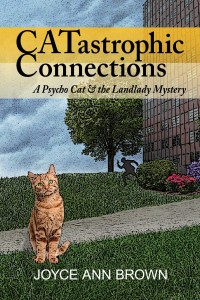Today’s post is by award-winning author Joyce Ann Brown. She writes the Psycho Cat and the Landlady Mysteries. Since she has cats and is a landlord, she knows what she’s talking about. But she says none of her tenants has been involved in kidnapping, theft, or murder. She talks about the tradition of storytelling.
the Psycho Cat and the Landlady Mysteries. Since she has cats and is a landlord, she knows what she’s talking about. But she says none of her tenants has been involved in kidnapping, theft, or murder. She talks about the tradition of storytelling.
For centuries, people spread their stories—news, legends, songs, myths, editorial comments, and, yes, their gossip—by word of mouth. We’re so advanced in this day and age that we now learn much of the above (yes, even gossip—misinformed letters to the editor, forwarded bogus emails, repeated media coverage of celebrity gaffs) through print or video sources. For sure, animosity can be spread around the world at the speed of a satellite, but so can messages of peace, hope, and silly animal tricks. Advanced? Or just different?
Is the verbal telling of our stories dead? Do we sit with our phones or tablets to read or watch at the expense of personal interaction or listening to oral presentations? Are people reading and watching without thinking? My opinion is that traditional story telling remains alive, just like reading books is as popular as ever.
For example: when my friends meet to walk a trail, exercise is our goal, but interesting conversation (sharing stories) becomes an important benefit. Our chatter doesn’t stop—well, maybe for a minute when we have to huff and puff our way up a steep incline—and it morphs continually from discussions of the latest newspaper story to an interesting science fact seen on the Discovery Channel to what’s happening on Downton Abby to religion to politics to books and movies… Oftentimes, we tell humorous stories from our pasts.
For another example: most of the time, people in restaurants and other public places talk to each other. Oh, yes, you say, but look at those people mesmerized by their cell phones, oblivious to their companions. What do those folks do with the information they learn via electronic gadgets? Some of it, naturally, goes in one eye and out the tops of their heads. Lots of times, though, they share what they’ve learned by telling someone. “I found out on Facebook that Lucy had twins.” “Look at this cute photo.” “Isn’t it awful about the mudslides in California? I saw one of those once, and let me tell you…”
Stories from the oral tradition, which have been passed down for centuries, become subject matter for our movies, books, and pictures. Consider all the fairy tales and legends so popular today. Pictographs and Hieroglyphics visualized stories that were first told orally and subsequently retold from the pictures. The authors of Harry Potter and Star Wars have reimagined the mythology of the world.
 Modern audiobooks help continue the cycle. I, as an author, use in my works many stories that I hear from friends, overhear, or experience myself. Now, one of my books, Catastrophic Connections: A Psycho Cat and the Landlady Mystery, is being made into an audiobook. People get to hear the stories I put into print after hearing them told.
Modern audiobooks help continue the cycle. I, as an author, use in my works many stories that I hear from friends, overhear, or experience myself. Now, one of my books, Catastrophic Connections: A Psycho Cat and the Landlady Mystery, is being made into an audiobook. People get to hear the stories I put into print after hearing them told.
Having an audiobook made from my work has been an eye-opening, time-consuming, humbling, but gratifying interactive experience. It’s unsettling sometimes to hear my story read aloud and interpreted by the narrator, Diane Marty, an actress-turned-voice-artist. But I’m lucky she listens and responds when I tell her how the little old lady sounded in my head.
How was I to know that Diane would find so many separate words that should be compounded? It’s good that I’ll be able to correct mistakes in my manuscript and issue a new edition after this process is over.
Should I have foreseen that our project would be slowed because we had trouble deciding whether the name of one of the main characters, Adrianna, should be pronounced A-dree-an-uh or A-dree-ahn-uh? Ms. Marty had recorded the first ten chapters before we decided she wasn’t pronouncing it my way, and she was game enough to rerecord all those chapters.
Listening to each chapter after the narrator has recorded it, sending her the exact spot on the audio where she missed a word or where I want a change, changing the mistakes she finds in the text, and listening again after all the errors have been corrected (we hope) take lots of our time. The results, though, are well worth the work. I find myself hoping tons of people will find and listen to this awesomely-told version of my book and enjoy it as much as I have enjoyed helping to produce it.
What do you think? Is the story telling tradition still alive?
Find out more about Ms. Brown’s books at http://Author.to/joyceannbrown.
Follow her on Facebook: http://www.facebook.com/joyceannbrownauthor.
And please leave a comment on your thoughts about the story telling tradition. Thanks.


What an interesting piece. I never thought about the difficulties in audio books. Thank you for sharing the woes and highs with us. Great sharing
Good comments. I see the cell phone users, too. But I’m optimistic that those young people will often use all they learn to interact face to face.
Elaine, I plan to promote the audiobook in some of the same ways I promote my books but maybe add audio or video clips. Anyway, this is another market.
I don’t think telling a good story will ever go out of style. At least, I hope not.
I am concerned though about future generations. We grew up talking to each other, face to face, but that doesn’t seem to be the case anymore. I’ve seen rooms full of young adults on their cell phones, ignoring the people sitting right next to them. As humans evolve, will cell phones become appendages? I wouldn’t discount the possibility. Scary!
Interesting that you have journeyed into the audio version. I can imagine it is a whole new world of fun, but also problems and issues to worry about. Hope it works out well for you. How do you plan to promote this audio version?